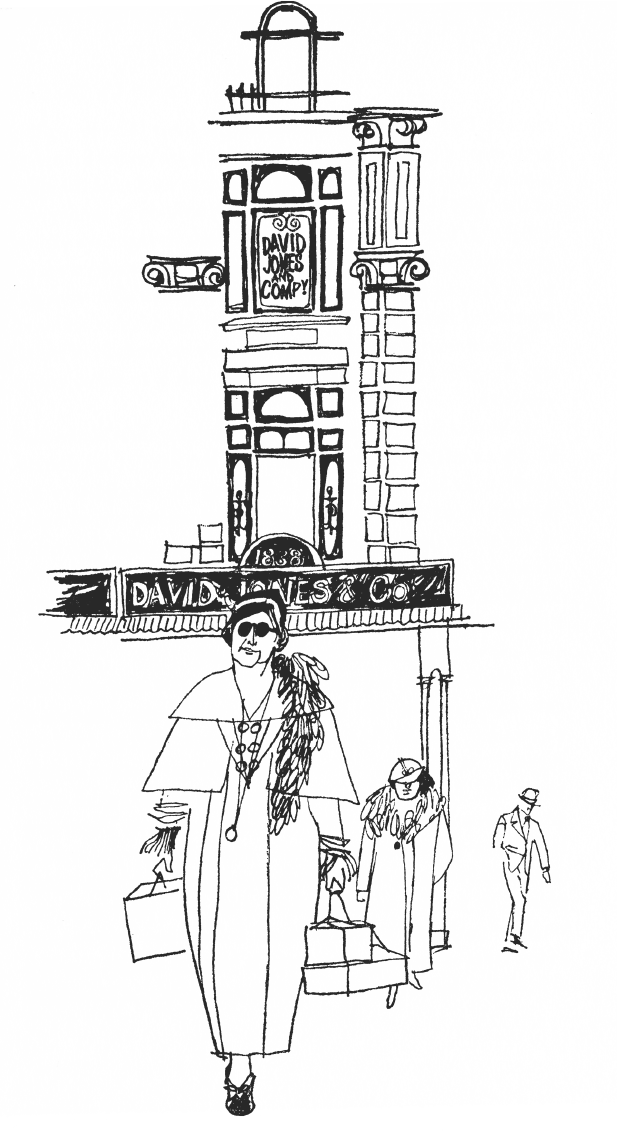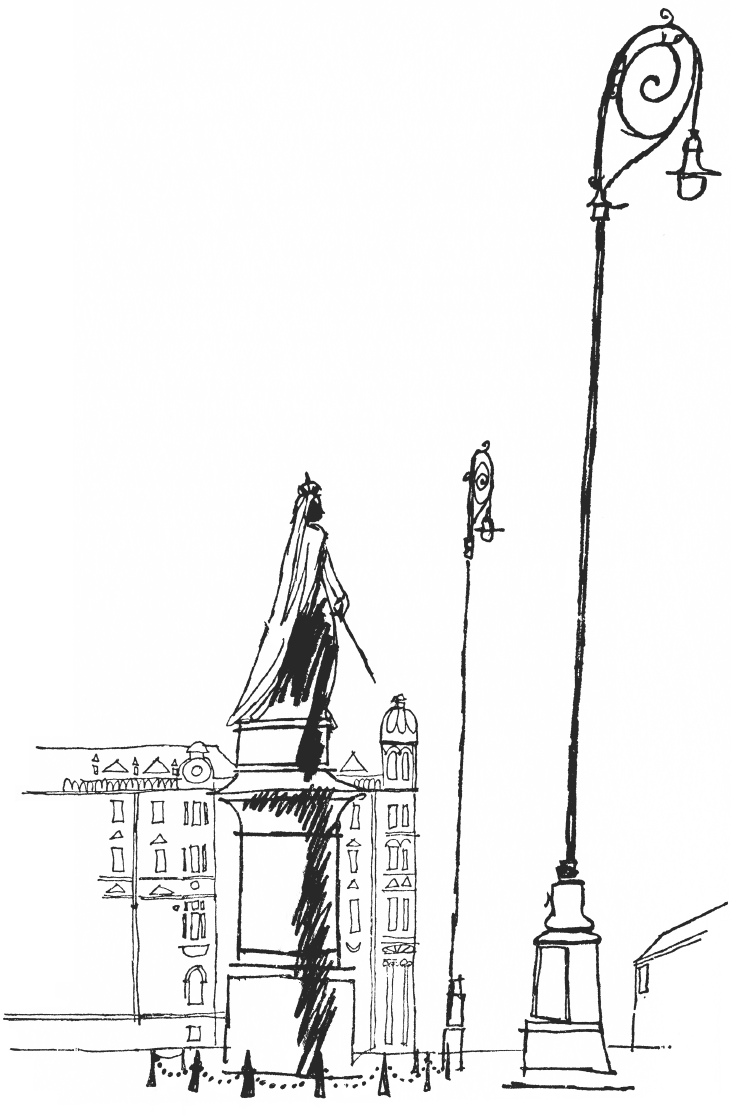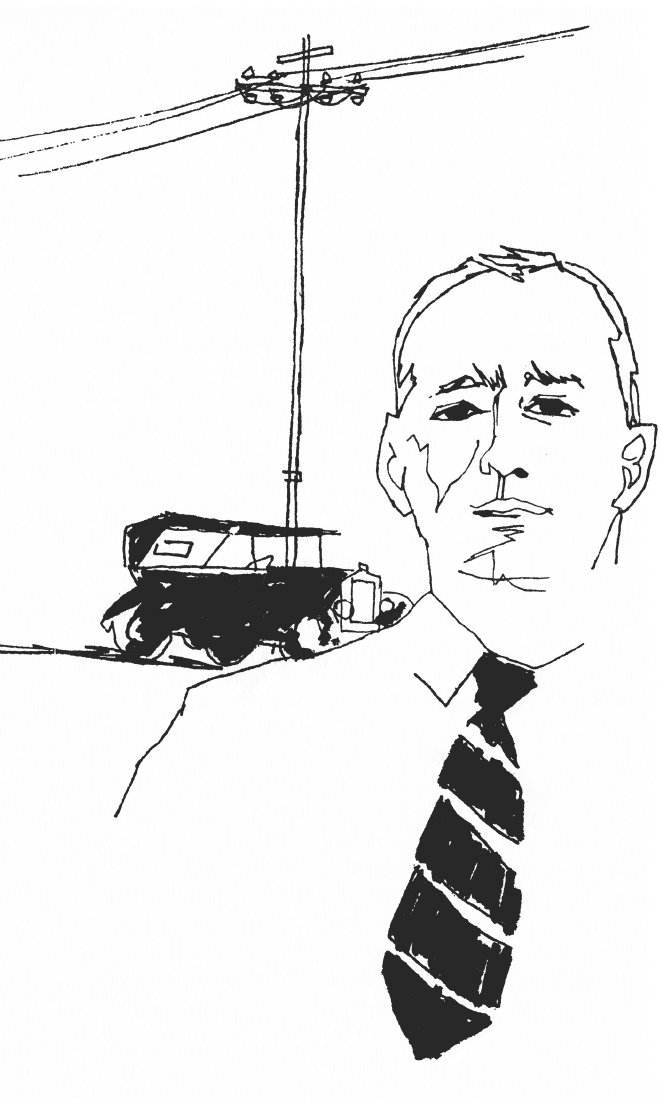Aunts Up the Cross (9 page)


In consequence, my mother, who was not very rich, was constantly in debt. She never really grasped the principle of accounting, but she did know that bills were almost invariably typewritten, and that a typewritten envelope was apt to contain a bill. So she evolved the happy plan of putting all typewritten envelopes unopened in the kitchen drawer. There they lay, piling up explosive potential until the day the drawer would no longer close and various apologetic little men would present themselves at my father’s door. He, poor man, invariably paid, and so there would be another unholy row. Many years of marriage never taught him the futility of trying to instil into his family his own thrifty and practical principles. We were hopelessly lost to my grandmother’s far gayer and pleasanter pattern for living.
My father’s only financial indulgence was in racing, and he was constantly working out a ‘system’. Very occasionally the system worked and my father smugly came home with bulging pockets. On these occasions my mother attempted to have him make up her own losings, with no success.
Once, after a fairly spectacular win and a firm refusal to my mother’s entreaties, he went off to Richard Hunt’s, Sydney’s best men’s shop, and bought himself several pairs of imported, expensive and superfluous woollen socks. My mother, on seeing the socks, was incensed.
‘Amy,’ she called to the maid, ‘Come here and catch me a moth!’
Apart from racing, I don’t know if there was anything peculiarly Australian about our home life. Perhaps the informality and wholehearted participation of all friends and attendants in our family affairs would have been impossible in a stricter culture. Sydney is a big city, but to some extent it still remains true that everybody knows their neighbour’s business, just as in a small country town anywhere in the world. I used to run away (certainly not because I was unhappy but for the fun of the journey) about once a month, but nobody worried. Usually I ended up in the greengrocer’s (Greek) at one end of the street, or in the tobacconist’s kiosk at the other, serving behind the counter. This was to me the ultimate adventure: all the shopkeepers in the Cross knew me and were quite willing to humour me, and my parents were fairly certain where to find me at bedtime. This was in an area quite as urban and crowded as present-day Knightsbridge, and so to a certain extent a spirit of frontier-day friendliness must have survived.
Everyone, of course, knew my father. His vast practice embraced all of the Cross and its inhabitants on the fringes of the underworld: the docks of Woolloomooloo; the slums of Surry Hills; and beyond them into the fashionable purlieus of the eastern suburbs. The traffic policeman on duty held up even the trams for him, and he was friend and counsellor to all the prostitutes of the Dirty Half Mile. He normally remained teetotal all year until my birthday three days before Christmas, when he drank, fairly solidly, until New Year’s Day. On Christmas Day he visited his poorest patients, taking them presents—a bottle of beer, wrapped in newspaper tied with a blue bow; a basket of a piece of soap, an orange and a bottle of eau-de-cologne with a pink bow—and stayed to chat and often have a drink with them. If it was beer, or gin or whisky (which he usually would have taken them) he would arrive home with a merry, tipsy chuckle and if it was a particularly revolting glass of cheap port and a wedge of rock-hard Christmas cake, he would surreptitiously deposit these in the earth of the pot plant usually gracing the ‘parlour’. Sometimes he brought home stories which had particularly amused him, and he loved the colourful vernacular of his slum patients—such as the usual East Sydney way of expressing righteous surprise at an unmarried pregnancy—‘I was only out with ’im once and ’e nicked it orf me.’ Sometimes stories of his own rejoinders reached us, such as his encounter at the fashionable and respectable ladies club, the Queens Club. At this stronghold of virtuous matrons a notice, redundant one would have thought, was posted on the board to the effect that males were not permitted above the first floor.
One morning at 7.30 a.m. my father was walking downstairs following an emergency visit to a patient on the second floor when he was greeted with horrified surprise by a member in dressing-gown and curlers.
‘Why, Doctor Eakin! Whatever are you doing here at this hour?’
‘Sssh,’ said my father. ‘I overslept!’
His red doctor’s light burned above our front door all night and the doorbell rang through the nights almost as often as the telephone. One particularly busy night—a baby having been delivered, the wounds of a gang fight stitched up, and the usual drunk dispatched home—my father fell into bed about 3 a.m., saying he would not be disturbed again for any emergency. Within ten minutes the doorbell rang. He cursed and snorted and turned over: nobody answered it and it went on pealing shrilly into the night. Whoever was ringing it was more determined than my father: eventually he was goaded out from under the bedclothes. He stuck his head out of his window directly over the front door and bellowed a string of curses at his tormentor. It was Joe, the hot dog man from the mobile all-night stand on the corner. Joe was a small, timid man, but he stood his ground and when my father’s invective had ceased, he blurted apologetically.

‘I’m awful sorry, doctor, but your house is on fire.’
Actually it was the chimney of the house next door but the sparks were sufficient to get us all from our beds and my mother up on to the roof with the firemen who were then called. Joe came in for a cup of tea and it all ended as a hilarious tea party.
It is the laughter I remember and miss most poignantly. The rows and the laughter were daily doses on which we thrived: frequently the laughter arose out of the rows, or out of the tears which followed them. I remember seeing my mother in tears one day following an outburst of my father’s and, puzzled by this constant drama in our lives, I asked her why she stood it. It seemed to me a one-sided persecution, as he never cried, and the kitchen drawer full of bills and the house full of interfering old ladies would never have occurred to me as a provocation.
‘Well,’ she sobbed, ‘I
couldn’t
live with the bastard if he didn’t make me laugh so much.’
I think it was the clash and mingling of the Irish and Jewish temperaments which produced this climate of high dramatic comedy. The fact that the doors were open and everybody joined in was pure Australian.
Although my father appeared in the role of resigned provider to a household of permanent guests, I think his enjoyment of their continual company equalled, in his much quieter way, my mother’s. At least he could escape, and frequently did—not far, to be sure, for to reach his bed he had to undress in one room and make his way in striped pyjamas through the crowded sitting-room to the verandah where he slept. But he had no inhibitions about doing this and the evening’s conversation continued to the accompaniment of his ferocious snores. He became, at this time, quite an established ‘club man’ and keen billiards player. His championship status ended on the day he shot himself; ever after, he found it painful and difficult to bend the affected knee into the prescribed position.
Actually his first two adventures with firearms weren’t too serious: only on the third occasion was any bodily damage done. The pistol was of very small, very smart Spanish manufacture—just large enough to lie in the palm of his hand, and affording a more comforting and solid feel than the thin jingle of key rings or the like with which some men fidget. He first came to carry one of these on the advice of the police, who were concerned over his lone night calls into the underworld areas of dock and slum land. Sydney had during the thirties a crime wave of serious proportions, terrorised by a gang of slashers known as the Razor Gang, and it was against the possibility of attack by these assailants that the gun was bought. On his first day home with his new toy, my father indulged in a little quiet target practice in the surgery, but beyond a ricocheting bullet which gouged some plaster out of the surgery wall, splintered a glass case full of instruments and bounced harmlessly out into the light area, no untoward incidents occurred. Secure in the assumption that he now knew when it was liable to go off, and when it was not, he took the gun out with him at night for as long as the situation lasted, and occasionally fondled it by day as it lay in his desk drawer. When war broke out, all licences to own firearms were reviewed: my father took his pistol up to No. 3 Police Station where, over a cup of tea with the Station boys, he missed the sergeant’s leg by inches.
On the afternoon he finally shot himself, my mother was upstairs and as usual entertaining some friends to tea. It was a humid, somnolent day, enervating; and the patient who was sitting by my father’s desk cataloguing her woes was one of his regular and more boring hypochondriacs, whose long list of ailments needed no further response than an occasional murmur of sympathy. While making these reassuring noises, he idly fingered the pistol in the middle drawer of his desk, lying in its accustomed nest of old papers, tobacco pouches, and pipe cleaners. As usual it was loaded and, as usual, my father hadn’t quite got the hang of it.

‘I get these terrifying palpitations, Doctor—sometimes when I lie down I think I’m going to choke. And then, suddenly, I’ll get a feeling of something awful about to happen—it’s my nerves, I suppose. Don’t you think I should have something to calm my nerves?’
‘Mmmm,’ said my father, and pulled the trigger.
The bullet made a deafening report, in the doubly confined space of the drawer, and of the consulting room. The initial impact of the drawer bottom probably lightened the blow, which nevertheless neatly blew off part of my father’s kneecap. The patient swooned—my father cursed and bellowed—the nurse ran in, first to mop up the blood and call an ambulance into which she assisted my father; then, to revive the patient and put her in a taxi. Upstairs my mother’s guests exclaimed at the noise, but my mother assured them, ‘Don’t worry. The doctor’s probably shot himself.’
It was not until some hours later that she learnt that her husband was in hospital, where he stayed for two weeks, the central figure of a good deal of amused attention.
Later that night, I opened the door to two plainclothes policemen.
‘Miss Eakin,’ they said, ‘you can tell that father of yours that if he doesn’t learn to use that gun properly soon, we’re going to take it away from him.’
While he was in hospital, the patient who had witnessed the accident recovered sufficiently to ring him for further professional advice. In fact, the hospital switchboard operators were pestered by the wretched woman, and finally agreed to ask the doctor for his opinion. The sister on duty came one day, ‘Mrs So-and-so is on the telephone. She says to tell you she has that sinking feeling again, and please, what should she do?’
‘Tell her,’ said my father, ‘to strike out for the shore.’
When I was thirteen, the tottering finances of the one remaining Miss Cheriton finally collapsed and Doone terminated its brief but illustrious ten years’ existence. It had, as a school, made its mark: it had panache—it was smart—it provided good educational facilities, and its older pupils of the finishing school level had become locally renowned for their looks. The Doone girls, in the Sydney of that day, was a collective term conjuring up an image of youthful, well-educated beauty gathered for the picking under one roof and the eager and not too strict chaperonage of ‘Cherry’. They frisked through amateur theatricals and the Arts, Government House dances, ADCs, and the last of Cherry’s money.